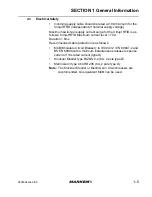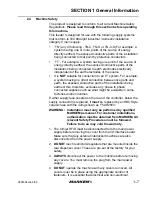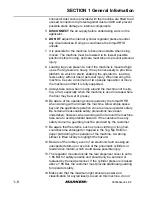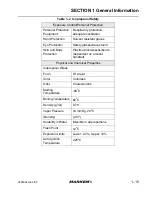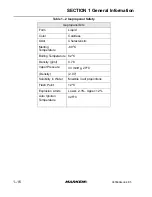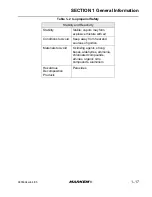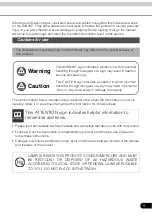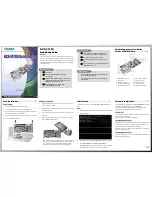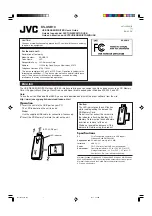
SECTION 1 General Information
1–2
m
®
0855804enb 4/05
programmer –
tag contents can be changed by a set of electronics
in close proximity or in electrical contact with them; those electronics
and their packaging are called a
programmer
RFID –
systems that read or write data to RF (radio frequency) tags
that are present in a radio frequency field projected from RF
reading/writing equipment; data may be contained in one or more
bits for the purpose of providing identification and other information
relevant to the object the tag is attached to; it uses electromagnetic
or electrostatic coupling in the radio frequency portion of the
spectrum to communicate to or from a tag through a variety of
modulation and encodation schemes
range –
distance at which successful reading and/or writing can be
attained
read –
decoding, extraction and presentation of data from
formatting, control and error management bits sent from a tag
readability –
ability to extract data under less than optimal
conditions
read rate –
maximum rate at which data can be read from a tag,
expressed in bits or bytes per second
read/write –
many applications require that new data, or revisions to
data already in the tag, be entered into the tag while it is still
attached to its object; tags with this capability are said to be
reprogrammable and are called
read/write tags, memory cards,
or
memory modules
reader –
device containing the digital electronics that extract and
separate the information from the format definition and error
management bits; digital electronics perform the actual reading
function; these read electronics may also interface to an integral
display and/or provide a parallel or serial communications interface
to a host computer or industrial controller
reader/writer –
the set of electronics can change the contents of the
tags while they are still attached to their object; they are called the
reader/writer
(see
reader
)
reprogrammable –
many applications require that new data, or
revisions to data already in the tag, be entered into the tag while it is
still attached to its object; the ability to read from and write data to
the tag while it is attached to its object is called
in-use
programming
; tags with this capability are said to be
reprogrammable and are called r
ead/write tags, memory cards,
or
memory modules
Summary of Contents for Cimjet RFID
Page 1: ...Cimjet RFID Operation Service Manual m Operation Service Manual Cimjet RFID...
Page 2: ......
Page 4: ......
Page 6: ......
Page 11: ...Cimjet RFID Operation Service Manual m SECTION 1 General Information...
Page 12: ......
Page 40: ...SECTION 1 General Information 1 28 m 0855804enb 4 05 Figure 1 4 Cimjet RFID Tag Optic...
Page 43: ...SECTION 1 General Information 0855904enb 4 05 m 1 31 Figure 1 6 Cimjet RFID Dispenser Stand...
Page 44: ...SECTION 1 General Information 1 32 m 0855804enb 4 05...
Page 45: ...Cimjet RFID Operation Service Manual m SECTION 2 Installation Guide...
Page 46: ......
Page 51: ...Cimjet RFID Operation Service Manual m SECTION 3 Operating Guide...
Page 52: ......
Page 65: ...Cimjet RFID Operation Service Manual m SECTION 4 Restricted Access Mode User Guide...
Page 66: ......
Page 85: ...Cimjet RFID Operation Service Manual m SECTION 5 Operating Modes...
Page 86: ......
Page 93: ...Cimjet RFID Operation Service Manual m SECTION 6 Preventive Maintenance Guide...
Page 94: ......
Page 107: ...Cimjet RFID Operation Service Manual m SECTION 7 Technical Information...
Page 108: ......
Page 140: ...SECTION 7 Technical Information 7 32 m 0855904enb 4 05...
Page 141: ...Cimjet RFID Operation Service Manual m SECTION 8 Troubleshooting Guide...
Page 142: ......
Page 153: ...Cimjet RFID Operation Service Manual m SECTION 9 Recommended Spares...
Page 154: ......
Page 158: ......

















